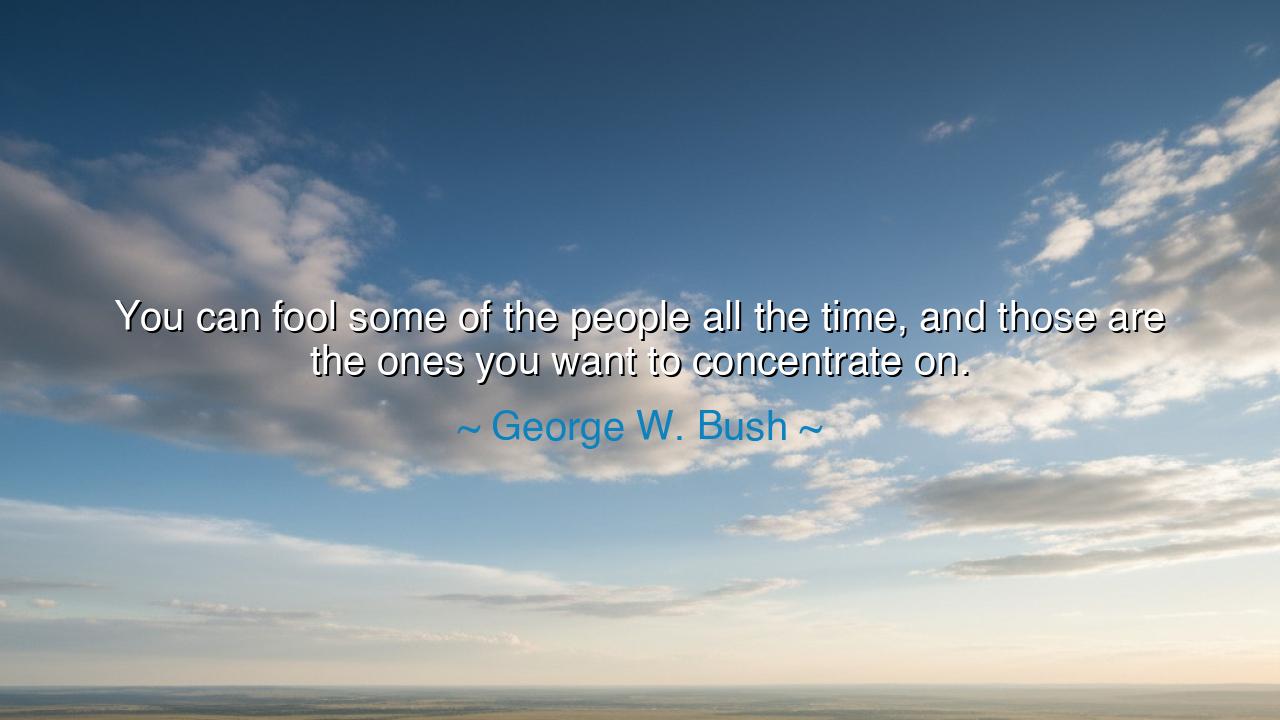
You can fool some of the people all the time, and those are the
You can fool some of the people all the time, and those are the ones you want to concentrate on.






The words attributed to George W. Bush—“You can fool some of the people all the time, and those are the ones you want to concentrate on.”—resonate as both satire and warning. They echo from an older root, for Abraham Lincoln once declared, “You can fool all the people some of the time, and some of the people all the time, but you cannot fool all the people all the time.” Where Lincoln sought to warn against the dangers of deception in leadership, Bush’s ironic twist (whether spoken in jest or misremembered) reflects the darker reality: that there have always been those who exploit the gullibility of a few to maintain power over the many. It is at once humorous and sobering, a reminder that human weakness is often the soil in which manipulation grows.
The ancients themselves knew this truth well. In the marketplaces of Athens, the sophists were masters of words, weaving arguments not to reveal truth but to sway the ignorant. Socrates opposed them, urging men to seek wisdom, not mere persuasion. The sophists, like the fools’ “concentration” in Bush’s words, thrived not on enlightening the masses but on targeting those most easily deceived. Thus, the quote speaks to a recurring pattern: those who would wield power through falsehood do not need to convince all—they need only enough of the willing or the naive to secure their rule.
History gives us tragic examples. Consider the propaganda machines of the twentieth century, where regimes rose not by winning every heart, but by capturing enough of them. In Nazi Germany, many resisted or doubted, but the leadership concentrated their efforts on those who could be fooled consistently—those who would repeat lies until they became truth in their own minds. The devastation that followed reveals the terrible cost when a society does not heed the danger of deception. To concentrate on the fooled is to build power on sand, but sand enough can still bury nations.
Yet this quote is not merely condemnation; it is a mirror, showing us our vulnerabilities. For each of us is tempted to believe what is comfortable rather than what is true. The danger lies not only in the deceivers, but in the deceived who refuse to awaken. It is “scary,” as James Wan once said of time, how quickly people grow accustomed to lies if they are repeated often enough. To laugh at Bush’s phrase is easy; to recognize ourselves in it is harder.
Beloved listener, the meaning is sharp: deception survives not because it is powerful, but because people allow themselves to be its audience. If there are always “some of the people” who can be fooled all the time, the true question is whether you will count yourself among them. The antidote is vigilance, humility, and the courage to question. For only a discerning people can resist the exploitation of their trust.
The lesson for us is this: do not surrender your mind to ease or laziness. Test every word spoken by leaders, entertainers, and even by friends. Ask whether it is true, whether it is just, whether it builds or destroys. Learn from history, for it tells us again and again that a handful of deceived followers can prop up entire empires of lies. To avoid becoming the “ones they concentrate on,” you must cultivate wisdom and discipline.
Practical wisdom demands this: read deeply, seek diverse voices, and resist the temptation to let others think for you. Do not be satisfied with the easy answer or the pleasing half-truth. And when you find yourself laughing at the absurdity of such a quote, let that laughter turn to resolve—to never be the fool who can be fooled all the time. For while deception will always exist, the truly free soul is one who refuses to be its willing captive.
So let this twisted phrase stand as a parable: “You can fool some of the people all the time, and those are the ones you want to concentrate on.” Laugh, yes, but also remember: deception thrives on the inattentive. Choose instead to be awake, to be vigilant, to be a seeker of truth. For in a world of shadows, the one who refuses to be fooled becomes a light not only for themselves, but for all.






AAdministratorAdministrator
Welcome, honored guests. Please leave a comment, we will respond soon